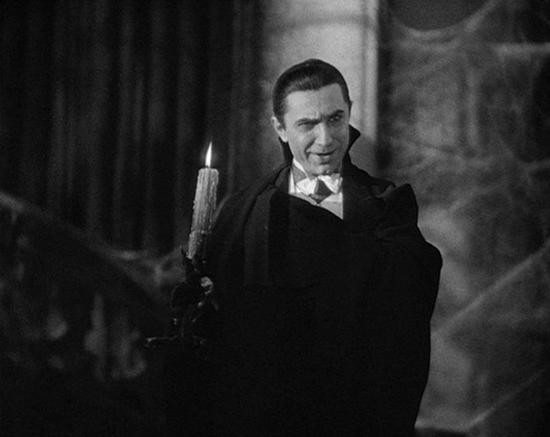
FILM TITLE: Dracula (1931)
ELAPSED TIME: 85 minutes (plus or minus a few in the middle)
WHY DID I STOP WATCHING? The Dracula was killed!
I’m not a fan of horror, but I find it hard to equate the mistily lit estates and silken gowns of Depression-era Dracula with “horror”. This movie is a horror as Miss Mina, Dracula’s would-be bride, pronounces it: “This horror,” she says, lifting pearly hand to porcelain face. The music swells. When Dracula’s three flapper brides leave their “earth boxes” and float eerily towards their caped husband, gruesome and Gatsby-ian, an undead convalescence seems almost attractive. I’m reminded of the essayist Leslie Jamison’s judgement that, in art, “The pain of women turns them into kittens and rabbits and sunsets and sordid red satin goddesses, pales them and bloodies them and starves them, delivers them to death camps and sends locks of their hair to the stars…. Violence turns them celestial.”

I watched an anniversary edition of this movie that was paired with a newish Philip Glass score, something I didn’t realize until halfway through the movie. I thought, “Wow, the 1931 version of Dracula sure does strike a lot of the same emotional notes as The Hours.” Glass’s score is quietly urgent and romantic, designed, as he put it, to fit the “libraries and drawing rooms and gardens” of the classic film. It lights on the mournful and disregards suspense. Even the freakiest of monologues (“Rats. Rats! Thousands! Millions of them! All red blood! All these will I give you if you will obey me!”), paired with Glass’s composition, feels more sad than scary.
Bela Lugosi is unlike anyone before or since as the sharp-toothed aristocrat from Eastern Europe. I found myself wondering whether my great grandfather’s generation actually had more corporeal stillness, or if Dracula’s unearthly composure was simply another facet of Lugosi’s mastery. His foil, the crazy-eyed Renfield (Dwight Frye), is as seething as Dracula is sadistically controlled. And then you have the strong-willed Van Helsing (Edward Van Sloan), a doctor whose strength of character allows him to embrace certain dark truths. “For one who has not lived even a single lifetime,” says Dracula, “You are a wise man, Van Helsing”
An uncle of mine, a fan of the vampiric, once made a point that has stayed with me— that Dracula is a sort of inverted Christ-figure. Instead of giving you his blood to drink, thus allowing for salvation, he drinks yours and keeps you away from heaven forever. So it is fair to see these characters eventual defiance of the Dracula as a heavenly allegory, as well as to accept the premise that to get to the light, you have to accept that real darkness exists. It’s an idea as transcendent as it is terrifying, which is probably why I made it through all 85 minutes of this one. I may not be as stolid with Dracula’s more recent incarnations.
Horrortober: Dracula (1931)